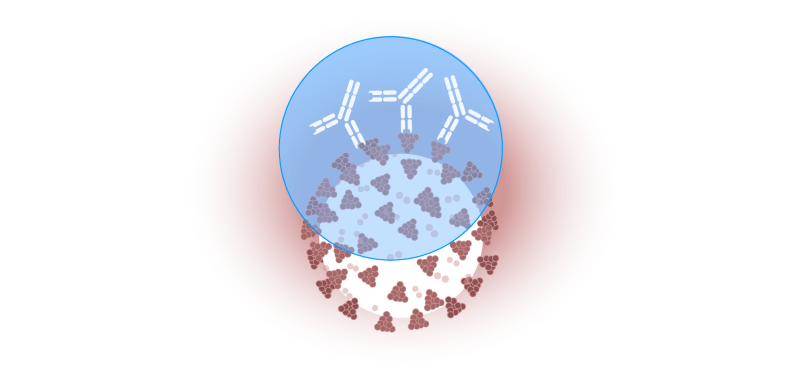- International News
- Mon-2020-04-20 | 04:55 pm

The first phase of testing has been about determining who has COVID-19. The next phase will be about who had it – or may still be fighting it.
Instead of looking in our throats for the coronavirus itself, health care workers will look for signs in our blood that we developed antibodies to fight the virus.
Infection rates. Researchers say many people have been asymptomatic – or didn't know they were inflected. Widespread testing would provide insights into how prevalent the most serious cases have been.
Herd immunity. If a large percentage of people in a city or state have those antibodies, researchers might determine there is enough herd immunity to protect those who haven't contracted the virus.
Marc Lipsitch, a professor of epidemiology at Harvard and an expert in public health interventions, told the USA TODAY Editorial Board on April 8 that a significant portion of the population must be immune to the coronavirus before social distancing restrictions can be lifted.
Unproven tests. Inaccurate results: Public health labs worry 'bad data' could taint U.S. recovery from coronavirus crisis.
class="presto-h2" style="box-sizing: border-box; margin: 0px; padding: 0px 0px 1rem; font-weight: normal; font-family: 'Segoe UI Semilight', 'Segoe WP Semilight', 'Segoe WP', 'Segoe UI', Arial, sans-serif; font-size: 2.8rem; line-height: 1.214; color: rgb(51, 51, 51); font-style: normal; font-variant-ligatures: normal; font-variant-caps: normal; letter-spacing: normal; orphans: 2; text-align: start; text-indent: 0px; text-transform: none; white-space: normal; widows: 2; word-spacing: 0px; -webkit-text-stroke-width: 0px; background-color: rgb(255, 255, 255); text-decoration-style: initial; text-decoration-color: initial;">What is an antibody?
Antibodies are the body’s way of remembering how it responded to an infection so it can attack again if exposed to the same pathogen. People with antibodies in their blood have immune cells available to fight the virus, which lowers the risk of reinfection.
Antibodies are Y-shaped proteins produced by white blood cells to help stop a virus from intruding. Antibody tests look for two antibodies in the blood, immunoglobulin M (IgM) and immunoglobulin G (IgG).
IgM and IgG antibodies fight all kinds of infections. The blood tests for COVID-19 look for antibodies specific to this coronavirus, which shows whether the body is producing antibodies to it or to others such as the seasonal flu.
class="presto-h2" style="box-sizing: border-box; margin: 0px; padding: 0px 0px 1rem; font-weight: normal; font-family: 'Segoe UI Semilight', 'Segoe WP Semilight', 'Segoe WP', 'Segoe UI', Arial, sans-serif; font-size: 2.8rem; line-height: 1.214; color: rgb(51, 51, 51); font-style: normal; font-variant-ligatures: normal; font-variant-caps: normal; letter-spacing: normal; orphans: 2; text-align: start; text-indent: 0px; text-transform: none; white-space: normal; widows: 2; word-spacing: 0px; -webkit-text-stroke-width: 0px; background-color: rgb(255, 255, 255); text-decoration-style: initial; text-decoration-color: initial;">How tests find coronavirus antibodies
To create an antibody test, researchers isolate specific parts of the genetic material from a virus that correspond to the virus' outermost vulnerable layer – the place where antibodies attach themselves.
Once researchers isolate specific parts of the virus' genetic code, or RNA, they inject it into other types of mammal cells to make those cells grow with the same structure, or outermost shell, as the novel coronavirus.
"As they grow, they'll start to produce the spike protein," University of Arizona immunologist Deepta Bhattacharya said. "You can basically trick the cells into making what you want."
class="presto-h2" style="box-sizing: border-box; margin: 0px; padding: 0px 0px 1rem; font-weight: normal; font-family: 'Segoe UI Semilight', 'Segoe WP Semilight', 'Segoe WP', 'Segoe UI', Arial, sans-serif; font-size: 2.8rem; line-height: 1.214; color: rgb(51, 51, 51); font-style: normal; font-variant-ligatures: normal; font-variant-caps: normal; letter-spacing: normal; orphans: 2; text-align: start; text-indent: 0px; text-transform: none; white-space: normal; widows: 2; word-spacing: 0px; -webkit-text-stroke-width: 0px; background-color: rgb(255, 255, 255); text-decoration-style: initial; text-decoration-color: initial;">How to test for coronavirus antigens
The entire virus structure is known as an antigen – a foreign substance that engages the immune system. An effective lab-grown spike protein would have the same shape as the novel coronavirus.
Health care workers take a sample of a patient's blood and isolate the parts of the blood that contain the antibodies into a serum. If a patient has coronavirus antibodies, they would be found in the blood, along with the other antibodies.
Other tests can involve just a simple finger prick to draw a blood sample, which is collected with a plastic straw and deposited in a small cartridge along with a special solution of liquids that will cause a reaction. Ten minutes later, the test promises to tell you whether you've had COVID-19.
These tests are one of many antibody tests the FDA approved under its Emergency Use Authorization, which means they haven't been thoroughly reviewed by the agency and are not guaranteed to be accurate.
In a clinical evaluation, Zhejiang Orient Gene Biotech reported the finger-prick tests to be 61.8% to 94.4% sensitive, depending on the type of antibody that shows up in the test results, which means that the tests are reported to give accurate results 61.8% to 94.4% of the time.













